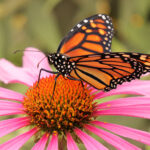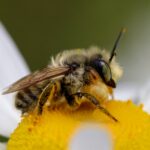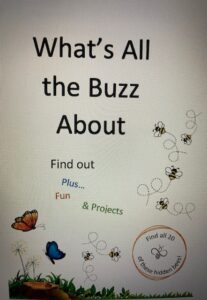There is an abundance of resources to help you plant and maintain a pollinator garden – from nurseries, books and articles to websites and podcasts with information on how to grow and protect pollinator habitats.
Check out our ever growing list of places and publications and start creating an environment where pollinators can thrive.
Check out our ever growing list of places and publications and start creating an environment where pollinators can thrive.
Native Plant Nurseries
-Here's where to buy them
Bayview Garden – large nursery and cafe on Whidbey Island that has been growing and cultivating native plants for over 30 years.
Go Natives! Nursery – A small retail nursery offering over 200 species of NW native plants.
Hima Nursery – Offers a large selection of quality native plants, shrubs and grasses.
Oxbow Conservation Center – Pacific NW organic farm with a native plant nursery and annual native plant sale.
Tadpole Haven Native Plants – This Nursery carries over 100 species of plants native to Western Washington. Open by appointment.
Wildflowers Northwest – This native plant nursery in Maple Valley offers a wide selection of regional plants. Shop online or set up an appointment.
Woodbrook Native Plant Nursery – offers a large selection of native plants. Their website gives detailed descriptions and beautiful pictures. Check the site for what is in stock.
Go Natives! Nursery – A small retail nursery offering over 200 species of NW native plants.
Hima Nursery – Offers a large selection of quality native plants, shrubs and grasses.
Oxbow Conservation Center – Pacific NW organic farm with a native plant nursery and annual native plant sale.
Tadpole Haven Native Plants – This Nursery carries over 100 species of plants native to Western Washington. Open by appointment.
Wildflowers Northwest – This native plant nursery in Maple Valley offers a wide selection of regional plants. Shop online or set up an appointment.
Woodbrook Native Plant Nursery – offers a large selection of native plants. Their website gives detailed descriptions and beautiful pictures. Check the site for what is in stock.


Native Plant Sales
Plan now for your spring planting. Many nurseries are taking orders now and in the next few months for delivery of plants in February and March. Order early for the best selection. And keep your eye on this space for updates.
Oxbow Farm and Conservation Center (Carnation) – Saturday Oct 5 from 10 am to 4 pm. Sign up for free tickets.
BetterGround – map of and links to Puget Sound conservation districts with native plant sales. Sign up for notices for online ordering.
King Conservation District – online sale in November for March pickup.
Snohomish Conservation District — online sale in January for March pickup.
Washington Native Plant Society, Salal Chapter – these plants will be available for fall planting. Online ordering has begun for delivery in late September, but hurry, ordering closes September 22.
Plants and Gardens
Better Homes and Gardens – 15 top native plants of the Pacific Northwest.
How to Create a Monarch Way Station – Steps for planting and maintaining a habitat for the endangered Monarch butterfly population.
King County Native Plant Nursery List
Kremp.com/Guide to Native Plants and Gardening – A step-by-step guide to planning, planting and caring for a native plant garden. Includes lots of links to other native plant sites.
Kruckeberg Botanic Garden – Pacific Northwest public garden in a wooded setting with native and exotic plants. Get inspired with a visit to the garden and nursery.
Northwest Native Plant Guide – Features plants native to Western Washington and native plant gardening tips.
Oregon State University Extension Service – Gardening with Oregon Native Plants.
Pollinator-Pathway.org – This is one of our favorite sites – so much information and here is where you can put your garden on the map.
Seattle Audubon Society – Plants for Birds Program. Find out how to bring birds to your home by planting native plants.
Snohomish County Native Plant Nursery List
Tilth Alliance – This organization promotes organic and sustainable practices in farms, gardens and kitchens.
Washington Native Plant Society – A great educational site that promotes the conservation and appreciation of Washington’s native plants.
The Wild Garden – An online treasure trove of facts, photos and folk wisdom about Northwest native plants. Soon to become a book!
Xerces Society – Pollinator conservation resources for the Pacific Northwest region – lots of links to plant lists, vendors and helpful hints.
How to Create a Monarch Way Station – Steps for planting and maintaining a habitat for the endangered Monarch butterfly population.
King County Native Plant Nursery List
Kremp.com/Guide to Native Plants and Gardening – A step-by-step guide to planning, planting and caring for a native plant garden. Includes lots of links to other native plant sites.
Kruckeberg Botanic Garden – Pacific Northwest public garden in a wooded setting with native and exotic plants. Get inspired with a visit to the garden and nursery.
Northwest Native Plant Guide – Features plants native to Western Washington and native plant gardening tips.
Oregon State University Extension Service – Gardening with Oregon Native Plants.
Pollinator-Pathway.org – This is one of our favorite sites – so much information and here is where you can put your garden on the map.
Seattle Audubon Society – Plants for Birds Program. Find out how to bring birds to your home by planting native plants.
Snohomish County Native Plant Nursery List
Tilth Alliance – This organization promotes organic and sustainable practices in farms, gardens and kitchens.
Washington Native Plant Society – A great educational site that promotes the conservation and appreciation of Washington’s native plants.
The Wild Garden – An online treasure trove of facts, photos and folk wisdom about Northwest native plants. Soon to become a book!
Xerces Society – Pollinator conservation resources for the Pacific Northwest region – lots of links to plant lists, vendors and helpful hints.
Pollinator and Habitat Resources
Xerces Society – Habitat restoration guidelines.
Grow It Forward Restoration – Gardeners in the greater Seattle area use native tree and shrub seedlings to restore critical habitats. Learn how to set up a micro-nursery in your own garden.
Washington Native Bee Society – Promotes awareness and conservation of solitary bees and their habitats.
Washington Butterfly Association – A non-profit dedicated to the appreciation and conservation of butterflies and other pollinators.
EarthCorps – Native Pollinator Habitat Restoration Guide.
David Suzuki Society – Messy Yards Help Bees
Snohomish Conservation District – Bees 101: Fast Facts
Leave the leaves. New York Times article about why you don’t want to rake them.
Savvy Gardening – There is a right and a wrong way to do spring garden cleanup. Here is an excellent article on doing it right.
Hugelkultur – WSU site tells us what it is and all the steps for building your own.
More hugelkultur – Five variations and all the lowdown on each one.
Flowers for Pollinators – this site offers info on the importance of milkweed to Monarch butterflies. It also includes lots of links on how to support healthy wildlife habitats.
Grow It Forward Restoration – Gardeners in the greater Seattle area use native tree and shrub seedlings to restore critical habitats. Learn how to set up a micro-nursery in your own garden.
Washington Native Bee Society – Promotes awareness and conservation of solitary bees and their habitats.
Washington Butterfly Association – A non-profit dedicated to the appreciation and conservation of butterflies and other pollinators.
EarthCorps – Native Pollinator Habitat Restoration Guide.
David Suzuki Society – Messy Yards Help Bees
Snohomish Conservation District – Bees 101: Fast Facts
Leave the leaves. New York Times article about why you don’t want to rake them.
Savvy Gardening – There is a right and a wrong way to do spring garden cleanup. Here is an excellent article on doing it right.
Hugelkultur – WSU site tells us what it is and all the steps for building your own.
More hugelkultur – Five variations and all the lowdown on each one.
Flowers for Pollinators – this site offers info on the importance of milkweed to Monarch butterflies. It also includes lots of links on how to support healthy wildlife habitats.
Educational Resources
This engaging Pollinator Elementary Curriculum workbook was designed by a high school student as part of her Girl Scout project. Her project was awarded the Gold Award, the highest achievement in the Girl Scouts. This booklet is a wonderful teaching tool for young people. The author explains the steps involved in pollination and the importance of protecting pollinators using illustrations, puzzles and games. Available to print or download.
Resources for a Healthy Environment
Reinvent your lawn – Interesting facts about how wasteful lawns are, and some thoughts on how to transform them.
Discover Magazine – Your perfect lawn is bad for the environment. Here’s what to do instead.
Glyphosate is the active ingredient in Roundup, a popular herbicide widely used in agriculture and home gardens. Read about the health hazards to pollinators and humans from the use of this product, and learn the healthy alternatives.
ConsumerNotice.org – This site offers alternatives to RoundUp that do not contain glyphosate and are made with natural organic oils and acid. Learn about the dangers of Neonicotinoids (“Neonics”):
Discover Magazine – Your perfect lawn is bad for the environment. Here’s what to do instead.
Glyphosate is the active ingredient in Roundup, a popular herbicide widely used in agriculture and home gardens. Read about the health hazards to pollinators and humans from the use of this product, and learn the healthy alternatives.
ConsumerNotice.org – This site offers alternatives to RoundUp that do not contain glyphosate and are made with natural organic oils and acid. Learn about the dangers of Neonicotinoids (“Neonics”):
- Xerces Society – Understanding Neonicotinoids
- Natural Resoures Defense Council – Neonicotinoids 101-The Effects on Humans and Bees
- American Bird Conservatory – Neonics and Birds
Books and Podcasts
Explore our list of books, videos and podcasts. And check back because we like to update it.

